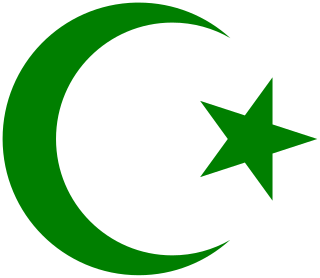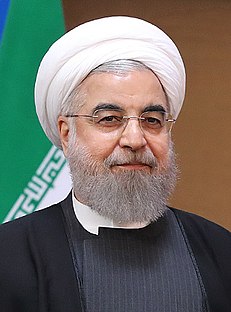External links
| This article about an Iranian politician is a stub. You can help Wikipedia by expanding it. |
Hojjatol-Islam Mousa Qorbani is a Conservative Islamic mullah who serves (as of 2007) as the presiding board member in the Islamic Consultative Assembly in the Islamic Republic of Iran. He is elected by people of Qaen (in Southern Khorasan) as the member of parliament.
| This article about an Iranian politician is a stub. You can help Wikipedia by expanding it. |

Sayyid Ruhollah Musavi Khomeini, also known in the Western world as Ayatollah Khomeini, was an Iranian revolutionary, politician, and cleric. He was the founder of the Islamic Republic of Iran and the leader of the 1979 Iranian Revolution, which saw the overthrow of the last shah of Iran, Mohammad Reza Pahlavi, and the end of the 2,500 year old Persian monarchy. Following the revolution, Khomeini became the country's supreme leader, a position created in the constitution of the Islamic Republic as the highest-ranking political and religious authority of the nation, which he held until his death. He was succeeded by Ali Khamenei on 4 June 1989.

An Islamic republic is a sovereign state that is officially ruled by Islamic laws and is not a monarchy. As a name or title, four states are Islamic republics: Afghanistan, Iran, Mauritania and Pakistan. Pakistan first adopted the title under the constitution of 1956; Mauritania adopted it on 28 November 1958; Iran adopted it after the 1979 Iranian Revolution that overthrew the Pahlavi dynasty; and Afghanistan adopted it in 2004 after the fall of the Taliban government.

The President of Iran is the head of government of the Islamic Republic of Iran. The President is the highest-ranking official of Iran. The President carries out the decrees, and answers to the Supreme Leader of Iran, who functions as the country's head of state. Unlike the executive in other countries, the President of Iran does not have full control over the government, which is ultimately under the control of the Supreme Leader. The President of Iran is elected for a four-year term by direct vote and not permitted to run for a third term or serve for more than 8 years in the office.

The Guardian Council of the Constitution is an appointed and constitutionally mandated 12-member council that wields considerable power and influence in the Islamic Republic of Iran.

The People's Mojahedin Organization of Iran, or the Mojahedin-e Khalq, is an Iranian political-militant organization based on Islamic and Marxist ideology. It advocates overthrowing the Islamic Republic of Iran leadership and installing its own government. The MEK was the "first Iranian organization to develop systematically a modern revolutionary interpretation of Islam – an interpretation that differed sharply from both the old conservative Islam of the traditional clergy and the new populist version formulated in the 1970s by Ayatollah Khomeini and his government". It is also considered the Islamic Republic of Iran's biggest and most active political opposition group.

The Iranian Revolution, also known as the Islamic Revolution or the 1979 Revolution, was a series of events that involved the overthrow of the last monarch of Iran, Mohammad Reza Pahlavi, and the replacement of his government with an Islamic republic under the Grand Ayatollah Ruhollah Khomeini, who was supported by the United States and was a leader of one of the factions in the revolt. The movement against the monarchy was supported by various leftist and Islamist organizations and student movements.

The Islamic Consultative Assembly, also called the Iranian Parliament, the Iranian Majles, is the national legislative body of Iran. The Parliament currently has 290 representatives, changed from the previous 272 seats since the 18 February 2000 election. The most recent election took place on 26 February 2016 and the new parliament was opened on 28 May 2016.

Sayyid Ali Hosseini Khamenei is a Twelver Shia Marja' and the second and current supreme leader of Iran, in office since 1989. He was previously the president of Iran from 1981 to 1989. Khamenei is the longest serving head of state in the Middle East, as well as the second-longest serving Iranian leader of the last century, after Shah Mohammed Reza Pahlavi.

Akbar Hashemi Rafsanjani was an influential Iranian politician, writer and one of the founding fathers of the Islamic Republic who was the fourth President of Iran from 3 August 1989 until 3 August 1997. He was the head of the Assembly of Experts from 2007 until 2011, when he decided not to nominate himself for the post. He was also the chairman of the Expediency Discernment Council.

The Iranian reformists are a political faction in Iran that support former President Mohammad Khatami's plans to change the Iranian political system to include more freedom and democracy. Iran's "reform era" is sometimes said to have lasted from 1997 to 2005—the length of Khatami's two terms in office. The Council for Coordinating the Reforms Front is the main umbrella organization and coalition within the movement; however, there are reformist groups not aligned with the council, such as the Reformists Front.

The Economic Cooperation Organization or ECO is an Asian political and economic intergovernmental organization which was founded in 1985 in Tehran by the leaders of Iran, Pakistan, and Turkey. It provides a platform to discuss ways to improve development and promote trade and investment opportunities. The ECO is an ad hoc organisation under the United Nations Charter. The objective is to establish a single market for goods and services, much like the European Union. The ECO's secretariat and cultural department are located in Iran, its economic bureau is in Turkey and its scientific bureau is situated in Pakistan.

The Constitution of the Islamic Republic of Iran was adopted by referendum on 2 and 3 December 1979, and went into force replacing the Constitution of 1906. It was amended on 28 July 1989. The constitution has been called a "hybrid" of "theocratic and democratic elements". While articles One and Two vest sovereignty in God, article six "mandates popular elections for the presidency and the Majlis, or parliament." However, main democratic procedures and rights are subordinate to the Guardian Council and the Supreme Leader, whose powers are spelled out in Chapter Eight.

The Muslim conquest of Persia (637–651) led to the end of the Sasanian Empire and the eventual decline of the Zoroastrian religion in Iran (Persia). However, the achievements of the previous Persian civilizations were not lost, but were to a great extent absorbed by the new Islamic polity. Islam has been the official religion of Iran since then, except for a short duration after the Mongol raids and establishment of Ilkhanate. Iran became an Islamic republic after the Islamic Revolution of 1979 which ended the Persian monarchy.

The Islamic Revolutionary Guard Corps (IRGC) is a branch of the Iranian Armed Forces, founded after the Iranian Revolution on 22 April 1979 by order of Ayatollah Ruhollah Khomeini. Whereas the Iranian Army defends Iranian borders and maintains internal order, according to the Iranian constitution, the Revolutionary Guard (pasdaran) is intended to protect the country's Islamic republic political system. The Revolutionary Guards state that their role in protecting the Islamic system is preventing foreign interference as well as coups by the military or "deviant movements".

The Islamic Republican Party formed in mid-1979 to assist the Iranian Revolution and Ayatollah Khomeini establish theocracy in Iran. It was disbanded in May 1987 due to internal conflicts.

The Iranian Armed Forces comprise the Army (Artesh), the Revolutionary Guard Corps (Sepāh) and the Law Enforcement Force (Police) of the Islamic Republic of Iran.

The Interim Government of Iran was the first government established in Iran after the Iranian Revolution, and the first nominal republic established in Iran after 2,500 years of Persian monarchy. The regime was headed by Mehdi Bazargan, one of the members of the Freedom Movement of Iran, and formed on the order of Ruhollah Khomeini on 4 February 1979. From 4 February to 11 February, Bazargan and Shapour Bakhtiar, the Shah's last Prime Minister, both claimed to be the legitimate prime minister; Bakhtiar fled on 11 February. Mehdi Bazargan was the prime minister of the interim government and introduced a seven-member cabinet on 14 February 1979. Ebrahim Yazdi was elected as the Foreign Minister.

The Supreme Leader of Iran, also referred to as Supreme Leader of the Islamic Revolution, but officially called the Supreme Leadership Authority, is the head of state, ultimate political and religious authority of the Islamic Republic of Iran. The armed forces, judiciary, state television, and other key government organizations are subject to the Supreme Leader. The current longtime officeholder, Ali Khamenei, has been issuing decrees and making the final decisions on economy, environment, foreign policy, education, national planning, and other aspects of governance in Iran. Khamenei also makes the final decisions on the amount of transparency in elections, and has dismissed and reinstated presidential cabinet appointees. The Supreme Leader directly chooses the ministers of Defense, Intelligence and Foreign Affairs, as well as certain other ministers, such as the Science Minister. Iran's regional policy is directly controlled by the office of the Supreme Leader with the Ministry of Foreign Affairs' task limited to protocol and ceremonial occasions. All of Iran's ambassadors to Arab countries, for example, are chosen by the Quds Force, which directly report to the Supreme Leader.

Hassan Rouhani is an Iranian politician serving as the current and seventh president of Iran since 3 August 2013. He was also a lawyer, academic, former diplomat and Islamic cleric. He has been a member of Iran's Assembly of Experts since 1999, member of the Expediency Council since 1991, and a member of the Supreme National Security Council since 1989. Rouhani was deputy speaker of the fourth and fifth terms of the Parliament of Iran (Majlis) and Secretary of the Supreme National Security Council from 1989 to 2005. In the latter capacity, he was the country's top negotiator with the EU three, UK, France, and Germany, on nuclear technology in Iran, and has also served as a Shi'ite ijtihadi cleric, and economic trade negotiator. He has expressed official support for upholding the rights of ethnic and religious minorities. In 2013, he appointed former industries minister Eshaq Jahangiri as his first vice-president.

The Government of the Islamic Republic of Iran is the ruling state and current political system in Iran, in power since the Islamic revolution and fall of the Pahlavi dynasty in 1979.